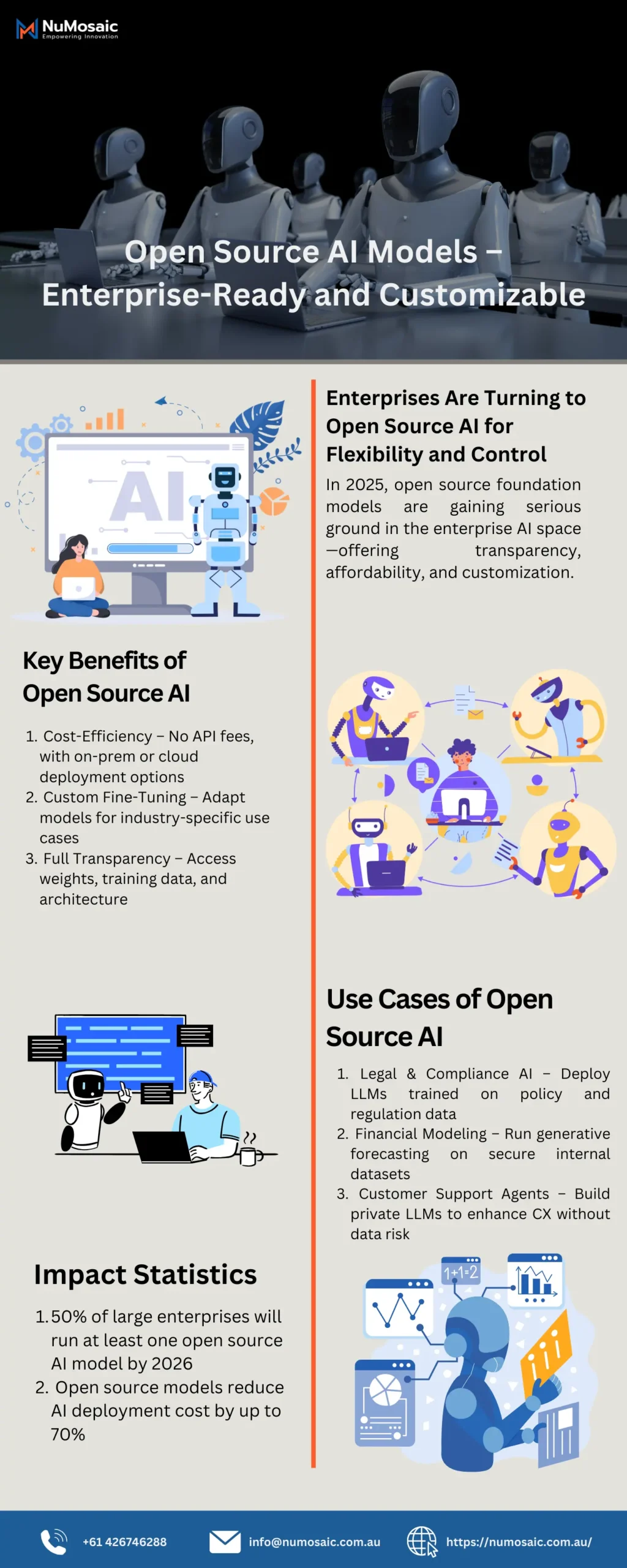What Are Open Source AI Models?
Open source AI models are machine learning and deep learning systems released with permissive licenses that allow free use, customization, and deployment. From language models to vision systems, these tools are now robust enough for enterprise-grade AI initiatives.
🛠️ Think of them as the building blocks of your AI strategy—modular, transparent, and tailored to your needs.
Why Enterprises Are Turning to Open Source AI
As generative AI and machine learning become mainstream, businesses are seeking:
Greater control over data, models, and deployment
Lower costs vs. proprietary AI services
Customizability for specific domains and use cases
Avoidance of vendor lock-in
It is enables all this—while accelerating innovation with a global developer ecosystem.
Leading Open Source AI Projects (2024+)
| Model / Library | Focus Area | Enterprise Fit |
|---|---|---|
| LLaMA 3 (Meta) | Large language models | Lightweight, customizable GPT alternative |
| Mistral / Mixtral | Open-weight LLMs | Efficient and performant for edge or private use |
| Hugging Face Transformers | Model hub & APIs | Massive ecosystem for NLP and multimodal tasks |
| LangChain | Agentic workflows | Chain-of-thought orchestration for LLM apps |
| Haystack | RAG pipelines | Enterprise search, question answering, chatbots |
| DeepSpeed / vLLM | Model optimization | High-throughput inference and training |
💡 Pro Tip: Combine open source LLMs with Vector DBs (like FAISS, Weaviate, or Qdrant) for advanced semantic search and retrieval-augmented generation (RAG).
Key Benefits for Enterprises
| Benefit | Impact |
|---|---|
| Custom Training | Tailor models to industry-specific data |
| Data Privacy | Run models on your own infrastructure |
| Cost Efficiency | No per-token API billing |
| Transparency | Inspect and modify model architecture |
| Scalability | Deploy at your own pace and footprint |
Common Enterprise Use Cases
🔎 Internal copilots for legal, HR, or finance
💬 AI chatbots with brand-trained LLMs
📄 Document summarization & Q&A
🔐 On-prem AI for regulated industries
🏭 Industrial or healthcare NLP pipelines
💡 Related Read: [Goal-Oriented AI Agents – From Reactive to Strategic AI Execution] (← insert internal link)
Challenges to Consider
Model tuning requires in-house expertise
Infrastructure (GPUs, vector DBs, storage) must be managed
Security & governance need to be enforced across the stack
However, with the right tooling and team, open source AI becomes a strategic advantage.
The Future of AI Is Open—and Yours to Shape
It is no longer just for researchers. It’s powering enterprise-ready applications with performance, flexibility, and trust at the core.
click here: AI journey

